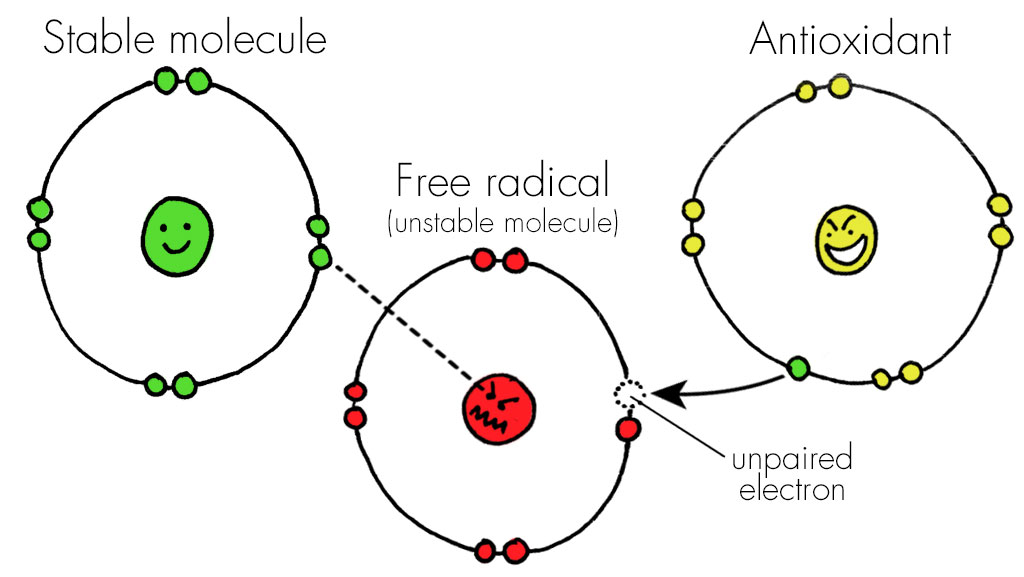What are antioxidants and where do we find them?
As a very general description, antioxidants can be described as pigments or colors of plants that are considered non-nutrients but that have many powerful health benefits. These pigments (antioxidants) can be found in all foods that contain color and are especially abundant in fruits and vegetables. Not only are antioxidants found in whole foods, but in recent times have become very popular as concentrated powders that can be added into smoothies or meals, as well as in supplement form. The best and easiest ways to include antioxidants in the diet would be to eat a wide variety of whole foods within the fruit and vegetable families. This way you can get an abundant supply of the many antioxidants available. For example, tomatoes contain an antioxidant called Lycopene, which is what gives tomatoes their red color. Blueberries contain antioxidants known as Anthocyanins, which contributes to the purple-ish blue color of the fruit. While most antioxidants are considered non-nutrients, there are some that are considered nutrients such as Vitamin C and Vitamin E. For this article, however, we will be focusing on non-nutrient antioxidants.

So, what do antioxidants do and how do they provide health benefits?
Antioxidants are like bodyguards – they shield you from harm caused by unstable molecules known as free radicals. These troublemakers, created during a process called oxidation, can damage your cells and pave the way for various health problems. Think of antioxidants as your defense team, preventing issues like heart disease, inflammation, and cancer in the long run.
It’s important to mention that oxidation is a natural process that occurs in the body and is necessary to some degree. However, oxidation can become a problem when too many free radicals are produced, which can lead to cellular damage, tissue damage, and chronic health conditions over a period of time.
Antioxidants help to counteract this process by helping to make the unstable molecule stable. In more science-based terminology, antioxidants do this by donating one of their electrons to the unstable molecule, which then makes it stable and less reactive. This in turn prevents the cellular and tissue damage that would otherwise occur due to the unstable molecules attempting to grab electrons from other molecules that make up cells and tissues. Therefore, antioxidants can help to act as protective mechanisms to prevent or reduce inflammation, tissue damage, chronic diseases, and also improve cellular healing, daily performance, and long-term vitality.

Image Source: Haleo UK
Is consuming too many antioxidants a bad thing?
It should be mentioned that we naturally have antioxidants present and produced in our body, which help to fight off free radical related damage. Also, oxidative stress is natural process that is necessary for our cells and tissues to regenerate and renew. However, while oxidation is normal at some level and while the body produces antioxidants to help combat oxidation, at times, higher levels of oxidative stress may be present and our natural antioxidant defence system may not be able to keep up. This is where dietary antioxidants can help. This is why consuming a wide variety of pigment-rich whole foods can be beneficial. Supplements can also help in this scenario but keep in mind that supplements are not meant to replace food entirely and aren’t meant to be consumed long-term.
* Key Take Away *
Focus on increasing your antioxidant intake by eating whole food. It’s rare to consume too many antioxidants from food alone. Focus on including more colourful fruits and vegetables into your diet to begin. Then, look at ways to add in other antioxidant-rich foods – you might be surprised that you already consume common ones like green tea and other herbal teas, raw dark chocolate, coffee, nuts, and red wine among many others!
Are you looking for ways to include more antioxidants into your diet but not sure how? We can assess your current diet and make a plan with you to ensure you’re meeting your needs. Contact us today!





